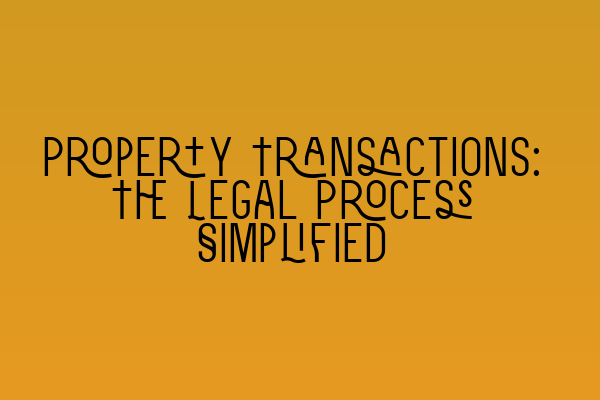Property Transactions: The Legal Process Simplified
Buying or selling a property can be an exciting yet complex process. There are multiple legal requirements and considerations involved, making it crucial to have a solid understanding of the property transaction process. In this article, we will simplify the legal process of property transactions and provide you with valuable insights to navigate through the intricacies of real estate transactions.
1. Pre-Contract Stage
The first stage of a property transaction involves the pre-contract stage. This phase encompasses the initial steps taken by both the buyer and seller to establish their intent and negotiate the terms of the transaction. During this stage, it is crucial to consult with a qualified solicitor who specializes in property law to ensure all legal requirements are met.
One key aspect of the pre-contract stage is understanding contractual capacity and its rights and limitations. Legal capacity plays a vital role in determining whether an individual has the legal competence to enter into a binding contract. To learn more about contractual capacity, click here.
Additionally, it is recommended to test your knowledge of contract law through interactive SQE mock tests. These tests can help you assess your understanding of key concepts and identify areas where further study may be necessary. Take the opportunity to test your knowledge here.
2. Exchange of Contracts
Once the terms of the property transaction have been agreed upon, the next stage is the exchange of contracts. This is where both parties formally commit to the transaction, and it becomes legally binding. It is crucial to carefully review the contract and seek legal advice before proceeding with the exchange.
As part of the contract law reforms, there have been recent changes to the legal framework governing property transactions. To gain a deeper understanding of these changes, read our analysis on contract law reforms.
3. Completion
The completion stage is when the property transaction is finalized. This typically involves the payment of the purchase price and the transfer of ownership from the seller to the buyer. It is important to ensure that all necessary documentation is in order and that the necessary searches have been conducted to protect your interests.
To better understand the rights and responsibilities of the parties involved in a property transaction, read our article on parties in a contract.
4. Post-Completion
Following completion, there are a few important tasks to be addressed. These include registering the property with the appropriate land registry, updating utility providers with the change of ownership, and arranging for any necessary repairs or renovations. It is advisable to consult with your solicitor to ensure all post-completion tasks are handled efficiently.
At SQE Property Law & Land Law, we offer expert guidance and comprehensive support throughout the property transaction process. Our team of experienced solicitors can assist you in navigating the legal complexities and ensuring a smooth transaction from start to finish.
For further insights and guidance, consider joining our SQE Contract Law webinars. Our webinars provide expert insights on key topics and address common challenges faced during property transactions. To learn more about joining our webinars, click here.
In conclusion, property transactions involve several stages and legal requirements. By understanding the process and seeking professional guidance, you can navigate the complexities successfully. Ensure you consult a solicitor who specializes in property law to ensure a seamless and legally compliant transaction.
